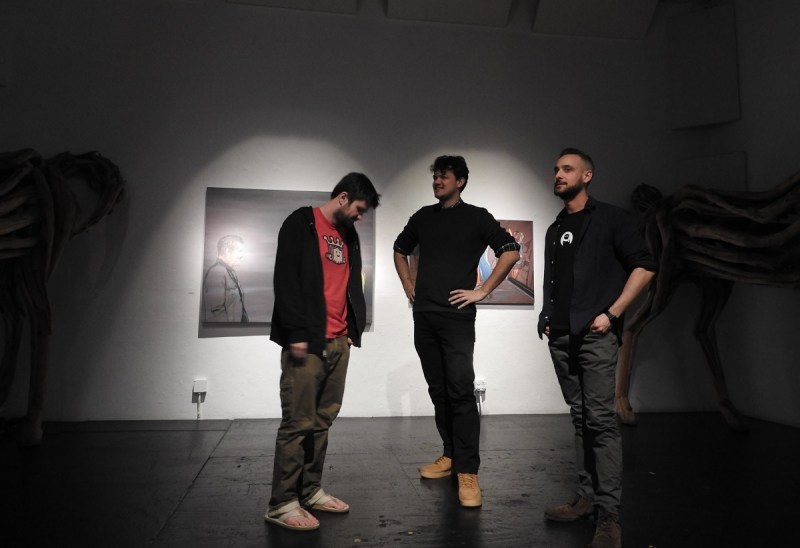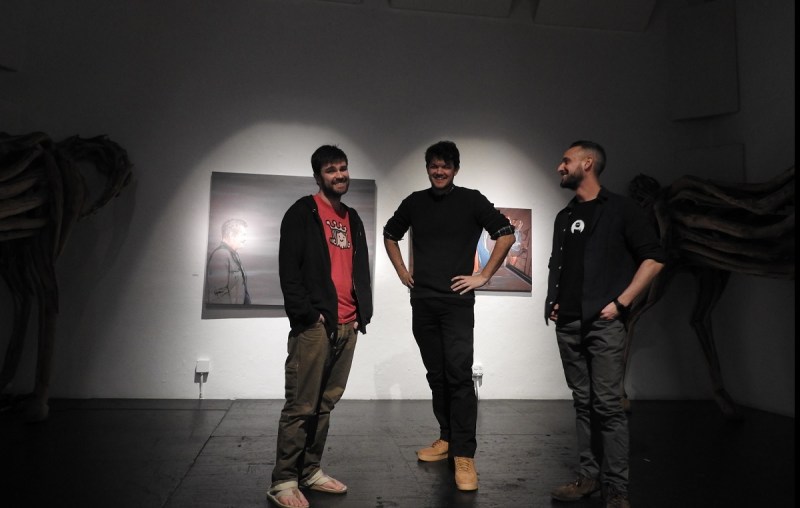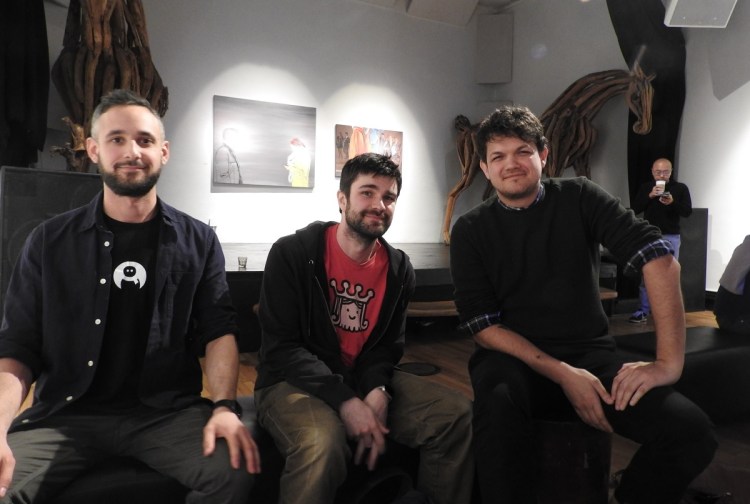
Above: iOS devs contemplating the future: Zach Gage (left), Dan Gray, and Ryan Cash.
Cash: This is me speaking for Apple, which I don’t want to do, but I think that philosophy also mirrors—if you look at other tech companies that make refrigerators and dishwashers and TVs and everything you can find in an electronics store. Then you have Apple which just famously says no. I think it’s what you say no to that ends up becoming who you are. The power to say no, even if there might be money on the table—is that a long-term decision that fits your values, your vision, and what you enjoy?
Gray: I’ve heard that phrase so many times, that idea that you’re leaving money on the table. But like you said about happiness, just the idea of focus—it’s hard enough to make a game anyway. Just creatively. You find yourself changing levels one or two weeks before the game launches. The idea of having to do that at the same time as all the technical requirements of 100 different devices—it just enables you to concentrate on you being happy, not stressed, and being able to deliver the best game possible first.
Gage: It’s a funny thing that happens specifically around technology. There’s a big feeling that tech is easy, even though most people don’t even really know how their phones work. It’s weird that they say, “Why don’t you release on Android?” Well, why don’t you build a phone yourself? It doesn’t make sense. It’s not something you’d apply to any other business. You don’t walk into a restaurant wanting a hamburger, see that they don’t have hamburgers, and say, “Why don’t you guys make hamburgers? You’re leaving money on the table!” It’s so weird.
Cash: I was just going to say, if you’re at a restaurant sitting there and wondering where your food is. it’s not as if they’re not bringing it out because they don’t want to. It’s for a reason. Things go wrong in the back. It’s busy. There are lots of moving pieces. It’s not that simple.
I think we’re all guilty, to an extent, of making those assumptions about industries we’re not familiar with. I remember, growing up, reading on a site like IGN, seeing that Gran Turismo is delayed. Why is it delayed? That’s crazy! I want it now! But it’s made by a massive team. There are people behind it. I think one thing, to speak to something you said—your overall happiness, that’s something we’ve been thinking about a lot lately. Finding the right balance where you’re happy and love what you do. Otherwise I think you’ll burn out and not enjoy it.
Gray: What’s genuinely helped us—the thing you’re talking about, where people just don’t understand. Players, customers, don’t understand. Why is this delayed by two weeks, four weeks? A lot of the time it’s because in the past they’ve seen an icon and they think any of our games are made by a company of 200 people. Actually, what we’ve seen is—after a couple of the stories we’ve done where it has photos of the studio and the people making it, people realize, “Okay, this is made by humans. It’s made by a small studio, a small team.” We’ve had people become a lot more friendly than they might have been two years ago, because they know it’s not 200 people making Monument Valley.

Above: A customer looks at Apple’s new iPhone X after it goes on sale at the Apple Store in Tokyo’s Omotesando shopping district, Japan, November 3, 2017.
Cash: Reaching out to people who email us and ask why our game is delayed—for example, with Alto’s Odyssey, we had announced it was launching the summer of last year, and we had to ultimately make a decision for the good of the game to delay that into February. People were disappointed. They tweeted and commented on Facebook and emailed us. But when we reached out and replied and explained why – that we’d rather do it right than do it earlier – when you have that conversation and the dialogue opens up a bit, most people understand.
But I can’t tell you how many emails we’ve gotten that are kind of nasty about all kinds of things. As soon as you reply – and this is true in almost any industry – they realize, “Oh, there’s a person here. It’s not just a graphic that I’m sending ones and zeroes into.”
GamesBeat: Creatively, it looks like you guys all feel it’s the right decision to develop on iOS. What has reinforced that, looking back?
Gage: I’ve been an Apple person for a long time. When I was nine and Apple stock was at 16, I told my mom to buy a bunch of it. [laughs] Honestly, the original reason I developed on iOS was because it seemed like a fascinating platform. The multi-touch was captivating. I had a piece of art that I had put on my website, where it got a bit of attention. I put it on iOS and it gots tons of downloads and made a bunch of money. People emailed and thanked me. I was like, “What is this magical box? This is incredible!” Then I basically tilted all of my focus into developing for it.
What’s been cool, as it has evolved—I’ve gotten a pretty good sense that the interests of Apple have aligned with the things that I’m interested in. I get the sense that Apple was trying to push paid games when everyone was going to free-to-play. They’ve redone the store so that they can promote the people behind games. They stuck with—Apple has this thing where they’ll stick with a technology until they see something that they’re absolutely sure is better, and then they’ll force everyone to move to it, even though people don’t really want to. Then you go to it and you realize, “Oh, this is better.” That’s what I’m interested in. I want to be on the device that has the things that are new and actually interesting.
One thing that’s been big for me lately is I love the haptics in the phone. I think the haptics in the iPhone are the best feature that’s been added to the phone in years. They’re leagues beyond anything else. I love my Nintendo Switch, but I think the haptics in the iPhone are way more important than HD rumble in the Switch. The reason is because on the phone, everybody plays their games on mute. All of the roles that sound plays when you’re designing something, that gets shut out on the phone. But now, with the haptics, you can do all the notification stuff and attention things you would normally do with sound using the haptics. You can design games that feel good and “sound” good, even when they’re played on mute.
That kind of tech, to see that stuff come out year after year—oh, now we can do high-density pixel displays and build games around that. Now we have haptics. Now we can do these new things. It’s a blast to develop on that, but also, for me personally, it’s fun. Every couple of years Apple comes out with this new design toy that I get to explore. What could this do? Where does this go?
Cash: It’s never gimmicky, either. It always has meaning. Someone didn’t just think of it and put it in there the next day. In many cases it’s probably been thought over for years. You know it’s refined. You know it’s probably staying there for the foreseeable future.

Above: Apple’s new headquarters
GamesBeat: Historically, the way I thought of the game platform companies — we have dedicated, intentional game platforms like Sony, Microsoft, and Nintendo, and then we see the accidental game companies like Amazon, Google, and Apple. Do you have a feeling about that, that it’s an accident that you’re on their platform and games have become this big thing?
Cash: As far as I can remember, computers have always had a couple of basic games installed out of the box, or easily available. Everyone knew gaming was there. But I don’t know if anyone knew how big mobile gaming would be.
Like Zach was saying earlier, one of the reasons iOS is so exciting for us, and for mobile in general—when someone buys a PS4 their intent is clearly to play video games. Maybe they got it because you can watch Netflix too, but the main reason is to play video games. Whereas most people bought an iPhone because they wanted the best phone. You have access to all of these people who don’t consider themselves people who play video games. Now you can reach that audience in a way you could never reach them before.
I’ve found so many new people who still wouldn’t consider themselves someone who plays video games, yet they play video games every day on their phone. That’s a unique opportunity. It’s really interesting for us.
Gray: The Sony example you gave is what happened to us. The week we launched Monument Valley, we had our Sony rep come to the studio and congratulate us. He said, “We really need you guys to sign up with us and develop a new game for our platform. How much will it cost for you to do this?” But we literally couldn’t do it. When someone’s made that decision to purchase a game console, they’re already a gamer. For us, the thing that’s been most amazing is to take the idea of what’s great about video games and let a mass audience understand that and experience it for the first time. Many people aren’t going to sit there and drop hundreds of dollars on a piece of hardware specific to gaming.
If I rewind five years to when I first turned up, the reason I joined Ustwo was because I found it fascinating to go into an environment of people who didn’t develop games and develop games in there. I didn’t know how it was going to work, but I knew it was going to be different. I knew they would be designed like applications are designed: for everyone.
When you talk about these accidental platforms, there are a lot of similarities there. You manage to make fresh new things if you don’t come at them from the same perspective. A lot of hardware manufacturers or existing games companies can be quite narrow-minded in what they accept as video games. It’s a really easy way to be fresh.
Cash: A perfect example is how Snowman accidentally got into making video games. We had no intentions of doing that. I left my previous job to make a reminder app called Checkmark. That was our first iOS app. At the time I had no plans to get into gaming. I grew up playing games, but I was never the world’s biggest gamer.

Above: Sophisticated iOS developers: Zach Gage (right), Daniel Gray, and Ryan Cash (right).
GamesBeat: Accidental game developers.
Cash: Exactly! We were about to start working on a utility app for iOS that was going to be this unique twist on a way to store voice memos and images and notes privately on your phone. This is back in 2012. Right before we got started on programming – we had already done the UI mockups – the designer said, “Hey, this reminds me of something.” It was that toy from the ‘80s, Simon, that big physical game that had the colors you’d tap out. We thought we could make that instead and see what we could do with a digital take on a physical toy. What could you do when you weren’t bound by physical restraints?
We started exploring all these ideas on how you could do a modern version of that game in a software environment. None of us knew how to make games. None of us even played games that actively. This was a game could non-gamers could make, though. It’s essentially shapes and colors and sounds. It was an easy step into that environment. Next thing you know, here we are making games.
What we’re excited about ourselves is just the fact that games are art. “Game” is such a broad term now. It can range from something like Call of Duty to Candy Crush and everything between and around that. We approach it as art. The fact that people can be interested and excited by it, even if they don’t play it, is really interesting to me. Someone can enjoy the things we make even if they don’t enjoy playing it themselves. You can hang a Monument Valley poster on your wall, even if you don’t play puzzle games.
My grandparents, for example, when I showed them the first trailer for Alto’s Adventure, they made me play it three or four times. They have a print of the game hanging on their wall. It’s not just because it’s their grandson’s, but because they genuinely like the way it looks. But they’ll never play the game. That’s a really exciting thing to see.

